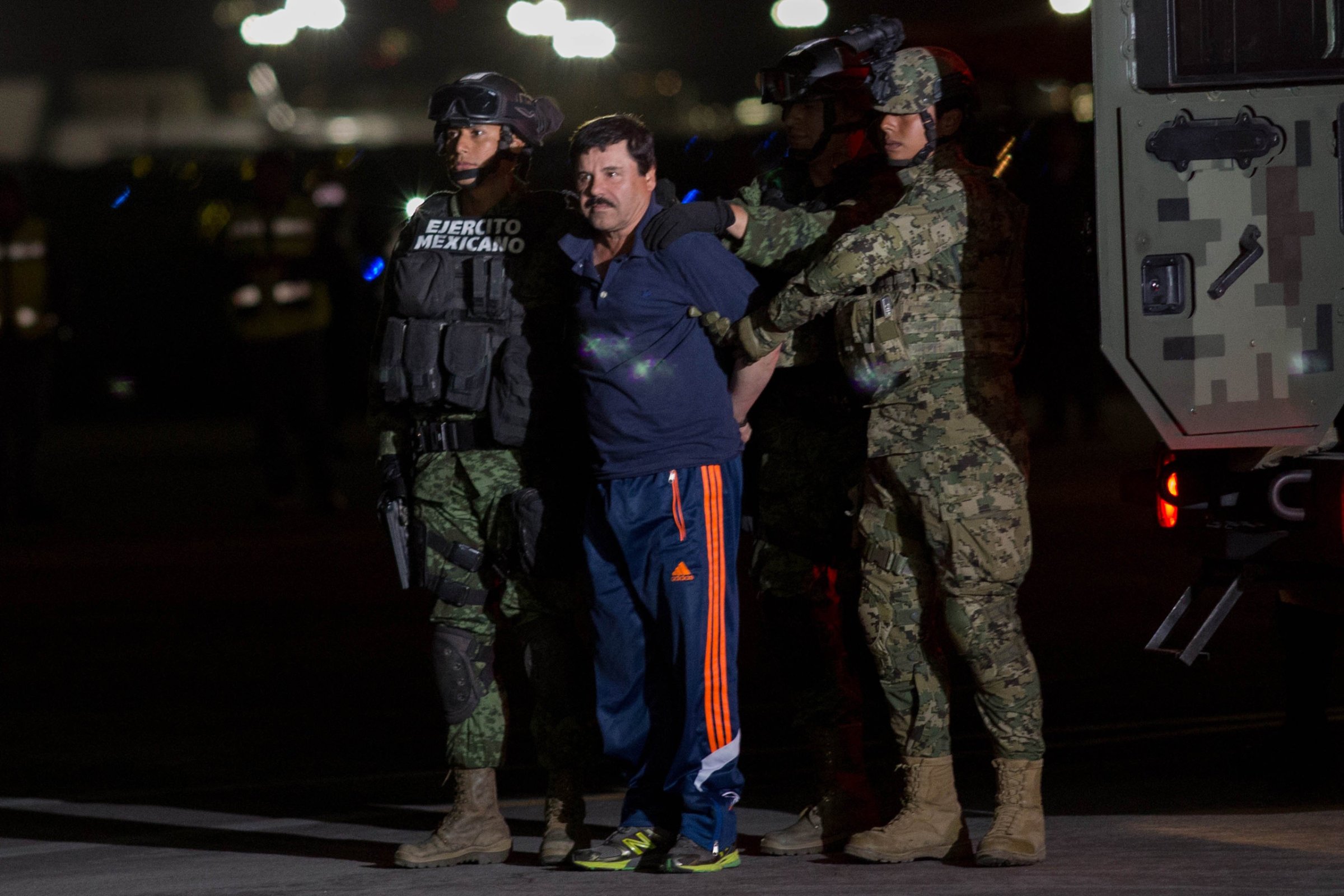
Joaquín “El Chapo” Guzmán became the world’s most powerful drug lord with few ever hearing his voice. He preferred to be known through his actions, which were lionized in narcocorrido folk songs and recorded in U.S. federal indictments. There were the trails of bodies and bribes he left across two countries, the tons of cocaine, amphetamines, heroin and marijuana he shipped north, the two cinematic escapes from high-security Mexican prisons and the billon-dollar criminal empire backed by an armed militia. Communities as far away as Chicago recognized his accomplishments, naming him the first Public Enemy No. 1 since Al Capone.
Then on Jan. 8, the ballad of Guzmán got a new verse. After a bloody shoot-out with the Mexican navy in the seaside town of Los Mochis, the gangster known as Shorty escaped through rain-soaked sewers and hijacked two cars, only to find himself once again in federal custody. “Today Mexico confirms that its institutions have the necessary capacity to confront and overcome those who threaten the tranquillity of Mexican families,” crowed Mexican President Enrique Peña Nieto.
But the government would not have the last word, for it was only then that El Chapo broke his silence–in the magazine Rolling Stone of all places, through an interview with the actor Sean Penn, in an article whose every word Guzmán had approved by agreement before publication. The message delivered by the world’s most wanted drug runner, who has been shopping his story for Hollywood treatment, was as cutting as it was undeniably true. “People who dedicate their lives to this activity do not depend on me,” he said of the industry that satiates the illicit appetites of the American public. “The day I don’t exist, it’s not going to decrease in any way at all.”
No one who knows the ways of Guzmán and his kind would disagree. His Sinaloa cartel is not a top-down corporation but a federation of tens of thousands of criminals–farmers who grow opium poppies, marijuana and coca leaves; chemists who cook heroin, cocaine and meth; smugglers who get it all over the border; corrupt police officers who look the other way; and accountants who wash the money. The network began in Mexico’s Sinaloa state a century ago, some 40 years before Guzmán’s birth, after Washington restricted opium with the 1914 Harrison Narcotics Tax Act. “Drug trafficking is already part of a culture that originated from the ancestors,” Guzmán told Penn.
Today the network stretches from Sinaloa along a thousand miles of border, across the U.S. and as far afield as Colombia, the Philippines and Australia. Surviving a century of clampdowns, the traffickers have learned to compartmentalize into independent cells, honing their expertise. Guzmán, who boasts a fleet of submarines, said he sent his tunnel engineers to Germany for training. Surrounded by doting sons–and aided by a partner in crime, Ismael “El Mayo” Zambada, who remains at large–Guzmán long ago become more figurehead than dictator, his superstar status helping spread the influence of his cartel, which is only the largest of the roughly nine narcogangs that control whole areas of Mexico.
Even in handcuffs, he remains the most potent symbol of the drug war’s failure. With help from U.S. agents, Mexico has pursued what is known as the cartel-decapitation strategy for more than a decade, nabbing or killing capos with nicknames like “The Viceroy,” “The Maddest One” and “The Executioner,” as if cutting off the heads of snakes.
But the river of poison flowing north has not waned. Data from the Customs and Border Patrol shows no drop in the amounts of narcotics that agents on the southwest border have seized over the past decade–2.2 million lb. in fiscal year 2006 compared with 2.14 million lb. in 2015. Even the levels of violence between the cartels had no real impact on the smuggling operations. In 2006, Mexican police reported 11,800 murders, which rose to 22,800 in 2011, and dropped back to 15,600 in 2014.
“The arrest of El Chapo is a short-term political victory,” says Mexican security specialist Raúl Benítez-Manaut. “But it doesn’t mean a real success in the war on narcotrafficking.” Just as bootleggers kept brewing after Capone landed in Alcatraz, the legend of Guzmán will continue, in song and blood, even if he never spends another day in freedom.
More Must-Reads from TIME
- Donald Trump Is TIME's 2024 Person of the Year
- Why We Chose Trump as Person of the Year
- Is Intermittent Fasting Good or Bad for You?
- The 100 Must-Read Books of 2024
- The 20 Best Christmas TV Episodes
- Column: If Optimism Feels Ridiculous Now, Try Hope
- The Future of Climate Action Is Trade Policy
- Merle Bombardieri Is Helping People Make the Baby Decision
Contact us at letters@time.com